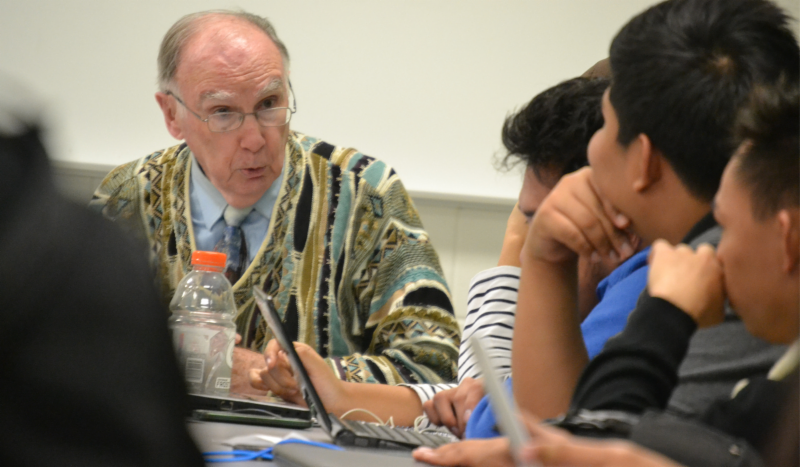To tell the story of Leonard ("Len") Swidler is to tell the story of the Temple's Department of Religion-and, in a way, the university itself.
Swidler started at Temple in 1966, shortly after the university became state-affiliated.
"Suddenly there was this influx of, relatively speaking, huge amounts of money," he explains. "The money situation shifted dramatically."
What this shift meant was that the university was able to hire hundreds of new faculty. Swidler was one of those hires-and almost accidentally. At the time, he was living in Pittsburgh with no plans to relocate. He was an associate professor in the philosophy department at Duquesne University. He had recently founded the
Journal of Ecumenical Studies (link is external), the first scholarly journal for interreligious dialogue, and he had an FM radio program where he would interview visiting academics.
"I wasn't interested in going anywhere," he says. "Things were so exciting there."
In fact, Swidler was actively seeking candidates for Duquesne's new theology department. One of the people he approached was a member of Temple's (also new) religion department, who said he would think about it and get back to him.
"A couple of days later he called me up and said, 'Well, I talked to my chairman Bernard Phillips and he said he wants to hire you, Leonard Swidler, your co-editor Elwyn Smith and the journal,'" Swidler remembers.
Though Swidler was not interested in the position, his co-editor was. Swidler agreed to take the interview for him but resolved to make a particular demand: he would not consider the job unless Phillips committed himself to hiring a number of faculty representing each major religion. "And I said to myself, 'Of course, he's not going to say yes, but that's it.'"
But Phillips surprised Swidler. "He said 'that's a great idea. I'll do it.' And he did it!"
This may not seem notable from a contemporary perspective, but at the time interreligious study was not standard practice. Departments typically only taught the prevailing religion of their particular university; moreover, many programs were housed within schools of divinity instead of majors within a liberal arts college.
Swidler, Smith and the Journal of Ecumenical Studies moved to Temple. Phillips kept his promise and the department grew in size and recognition.
"Bernard Phillips hired giants, and so Temple University's religion department was known worldwide, anywhere in a circle of academics in the study of religion," says Swidler. "There was no place where you could get a doctorate in religious studies. It did not exist. We were creating it."
Not everyone thought it was a great idea. The department model received criticism from the University of Pennsylvania.
"They were all Protestant, of course," Swidler explains. "The then-chair of that department publicly remarked that we were operating on the 'zoo theory.' What did he mean by that? Well, you have one lion, and you have one tiger, and you have one antelope; you have one Catholic, and one Jew, and one Presbyterian."
Of course, thanks to Swidler, there was not just one representative per religious group. There were many-more a safari than a zoo. Before long, the rest of the nation's universities followed suit.
This year, Swidler celebrates his 50th year at Temple University. The Journal of Ecumenical Studies remains the premiere journal for interreligious dialogue and has been joined by the
Dialogue Institute (link is external), the journal's home and outreach arm.
And what does he say to those who criticized his ideas?
"Imitation is the greatest form of flattery," he laughs.
Leonard Swidler is a Founder/President of ARCC.
_______________________________



